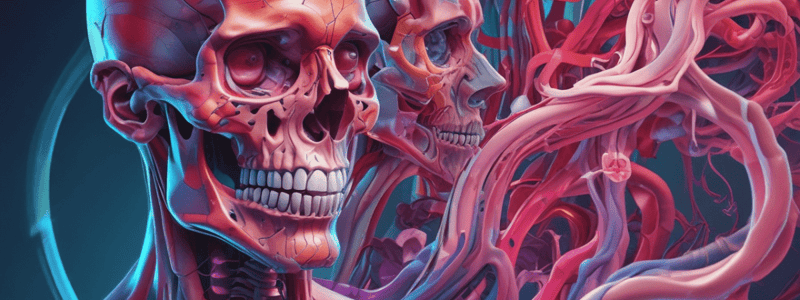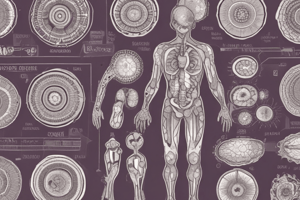Podcast
Questions and Answers
What is the primary difference between the fields of anatomy and physiology?
What is the primary difference between the fields of anatomy and physiology?
- Anatomy focuses on the structure of the body, while physiology focuses on its functions. (correct)
- Anatomy examines the placement and relationship of various organs, while physiology learns the names and locations of body parts.
- Anatomy investigates how the body responds to stress or illness, while physiology explores the body's structures.
- Anatomy is concerned with the study of cells, while physiology is concerned with the study of organ systems.
Which of the following is NOT a primary function of the human physiological systems?
Which of the following is NOT a primary function of the human physiological systems?
- Maintaining vital bodily functions like circulation, respiration, and digestion.
- Visualizing the internal structure of the body to understand the placement and relationship of various organs and tissues. (correct)
- Ensuring the survival of the human body.
- Comprehending why and how the body responds to stress or illness.
How does the study of cell biology contribute to our understanding of human physiology and anatomy?
How does the study of cell biology contribute to our understanding of human physiology and anatomy?
- Cell biology examines the structure and functions of cells, which are the basic building blocks of organs and tissues.
- Cell biology provides insights into medical conditions and treatments, helping healthcare professionals improve patient care.
- Cell biology focuses on the processes cells employ to maintain life, which is crucial for understanding how the body's systems function.
- All of the above (correct)
Which of the following is NOT a key aspect of the study of human anatomy?
Which of the following is NOT a key aspect of the study of human anatomy?
What is the primary role of the muscular system in human physiology?
What is the primary role of the muscular system in human physiology?
How does the study of organ systems contribute to our understanding of human anatomy and physiology?
How does the study of organ systems contribute to our understanding of human anatomy and physiology?
Which of the following is NOT a primary function of the cardiovascular system?
Which of the following is NOT a primary function of the cardiovascular system?
Which organ system is responsible for exchanging oxygen and carbon dioxide between the blood and air?
Which organ system is responsible for exchanging oxygen and carbon dioxide between the blood and air?
What is the primary function of the endocrine system?
What is the primary function of the endocrine system?
Which type of muscle fibers are responsible for powering the heartbeat?
Which type of muscle fibers are responsible for powering the heartbeat?
What is the primary function of smooth muscles?
What is the primary function of smooth muscles?
Which organ system is involved in breaking down food into usable substances and eliminating excess or unusable matter?
Which organ system is involved in breaking down food into usable substances and eliminating excess or unusable matter?
Study Notes
Anatomy and Physiology
The study of anatomy focuses on the structure of the human body, learning the names and locations of the body parts. On the other hand, physiology investigates the functions of these structures, asking questions like 'How do they work?' Both fields are closely related, as a part's function depends on its construction.
Human Physiology
Physiology explores how the body's structures operate, ensuring our survival through various systems. These systems are responsible for maintaining vital bodily functions like circulation, respiration, and digestion. Understanding human physiology allows us to comprehend why and how our body responds to stress or illness.
Human Anatomy
Anatomy is concerned with the study of the body's shape and structure. Through visualizing the internal structure of the body, scientists can understand the placement and relationship of various organs and tissues. Studying human anatomy provides valuable insights into medical conditions and treatments, helping healthcare professionals improve patient care.
Cell Biology
At the root of all bodily functions lies the cell. Cell biology examines the structure of cells, their functions, and the processes they employ to maintain life. Understanding cell biology is crucial for understanding human physiology and anatomy as it reveals how organs are constructed from cells and how these structures perform their specific tasks.
Organ Systems
The human body operates through a network of interconnected organ systems that collaborate to sustain life. These systems include:
- The cardiovascular system, responsible for distributing oxygen, nutrients, and hormones throughout the body while removing waste products.
- The respiratory system, which exchanges oxygen and carbon dioxide between the blood and air.
- The digestive system, involved in breaking down food into usable substances and eliminating excess or unusable matter.
- The endocrine system, providing chemical communication between different parts of the body.
- The muscular system, composed of muscles that provide movement, support, and heat production.
These systems work together to ensure efficient functioning of the entire body.
Muscular System
The muscular system consists of three types of muscle fibers: skeletal, cardiac, and smooth. Skeletal muscles provide movement and posture, while cardiac muscles power the heartbeat. Smooth muscles control internal movements like digestion, breathing, and urination.
Studying That Suits You
Use AI to generate personalized quizzes and flashcards to suit your learning preferences.
Description
Test your knowledge on the fundamentals of anatomy and physiology, including the study of human body structure, organ systems, cell biology, and the muscular system. Learn about how the body functions and maintains life through interconnected systems and cellular processes.





